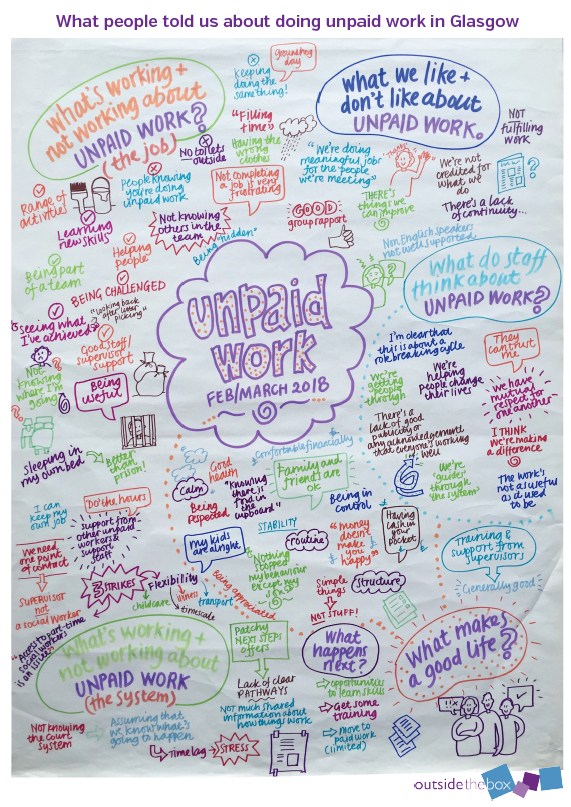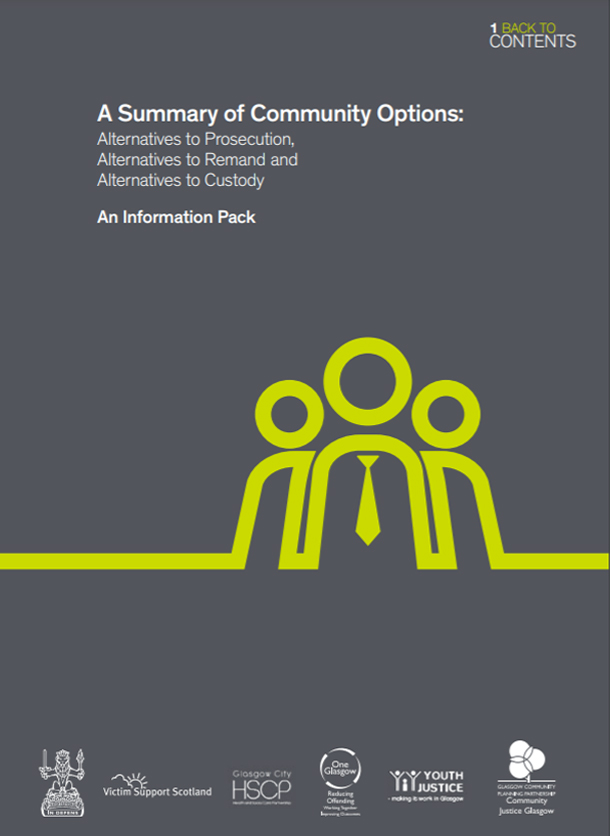Assistant Service Manager, Criminal Justice – Glasgow Health & Social Care Partnership
The Effective Community Intervention Working Group brings together partners from across Justice Services to work collaboratively in order to improve the effectiveness of the services commission to deliver Community Justice interventions such as Community Payback Orders, Diversion from Prosecution services, Alternatives to Remand, Bail supervision etc.
The User Voice workstream, was formed in 2020/21 with a long-term aspiration in Glasgow that client involvement and feedback would influence the design, management and the development of Community Justice services in the future.
There are several different levels of user involvement across Health and Social Care Services described below and some sections of the service, such as Mental Health Services have a strong tradition of engagement with those who use services:
Full control: Service users on boards and involved in decision making.
Sharing power: Share decisions and responsibility/Influencing and determining outcomes.
Participation: Make suggestions and influence outcomes.
Consultation: Asked what they think of services.
Information: Service Users are told what is happening.
No control: Passive recipients of services and actions.
Glasgow Justice Services has some tradition of engaging with service users – at times of inspection and for short time periods of engagement around group work or unpaid work activity as part of a Community Payback Order – when feedback is required to improve services and outcomes.
For example, in 2018, Community Justice Glasgow, commissioned Outside the Box, to work with staff and people in different community justice settings to explore participation and service user involvement in services.

As a result of the work and focus groups a ‘Participation in Unpaid Work Improvement Plan’ was developed with the actions being driven through collaborative working of the Unpaid Work Providers Forum.
At times there has also been activity about gleaning systematic feedback about the delivery of services and usually this has been done in paper form – these attempts have had limited success for a variety of reasons including literacy issues, over complex, lack of understanding of what is being asked.
The first task of the User Voice workstream was to design a long-term technological based solution to gather client feedback about services they received from Community Justice Services. Latterly called the Your Voice – Outcomes workstream. The working group was given the task of deciding upon a solution that could be embedded long term, used technology that increased the opportunities to respond, was separated from those directly delivering the service and one where outcomes were to be disseminated regularly to those delivering the service, as well as those responsible for oversight and direction of the Service.
Significant consultation has taken place across the Health and Social Care Partnership, Scottish Government and academic community to appropriately plan how this technological solution would be implemented and most importantly the type of questions and outcomes that clients could comment on and respond to in a meaningful manner. Clients have contributed to the workstream around methods of contact, consent, and types of questions that should be asked.
A Your voice electronic survey has been chosen that is sent to clients via mobile phone, email or in a paper format through a rolling client consent process. Clients gave feedback on this contact and this has indicated that they require a level of choice and flexibility.
A key requirement is a consideration of anti-discriminatory practice so those with reading and writing challenges and those who do not have English as a first language are included in survey work. The core requirement is clients consent regularly over the course of the order in relation to having contact with the Your Voice workstream.
Decisions have also been made about using Procedural Justice as the main theory base that informs the types of questions that are useful in understanding a client’s experience of contact with Community Justice Services. This relates to the quality of treatment and involvement in meaningful decision making, based on principles of trust, respect and having your voice heard. The theory indicates that when people feel they have been respected, included and heard they are more likely to have a positive view of the service and a much more negative experience, if these planks of good practice are not in place. The theory also touches on the quality of the relationship with the allocated worker which is key to achieving long term change.
The workstream intends to survey clients on Community Payback Orders including those on unpaid work, supervision and group work requirements. It will also contact those on Throughcare Licence, Drug Testing & Treatment Orders and Structured Deferred Sentences – for more information on these Community Options CLICK BELOW (Summary of Community Options). Structured questions are being considered for these types of orders and they will be examined by workers delivering and clients receiving the service.
The User voice workstream should develop and change overtime and hopefully will become embedded in 2021/22. There is an ambition that clients will be involved in collaborative commissioning approaches and designing a new Unpaid Work Service for women. Long term it will be important that women using that service are able to directly attend and contribute at meetings where providers and Senior Management discuss the service.
The Trauma Informed Practice Action Plan – developing across justice services as a result of the training being received through the National Health Service Education for Scotland National Trauma Training Programme – will contain strong elements of user voice to inform changes in practice especially around the physical environment – waiting/interview space – that we use and wider community Justice practice.




